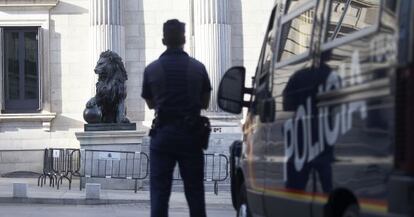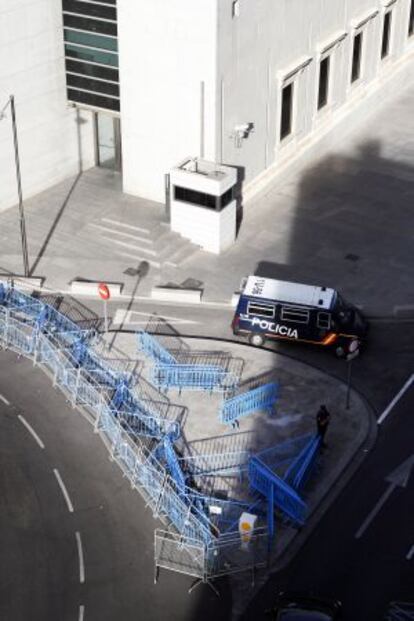Congress remains under police siege despite empty capital streets
Protests lull during vacation month but residents complain over ongoing blockade


Some of the streets surrounding Congress in Madrid look like those in a city under siege. Behind ranks of metal barriers stand armed members of the police's riot squad, constantly vigilant about who comes and goes around the parliament building. Residents and business owners have complained about the treatment being meted out to locals after the lower house became the focal point for citizen protests against the spending cutbacks of Mariano Rajoy's government.
In July, the police set up three lines of barriers to prevent protestors from reaching the Congress building. But the demonstrations have now lulled, at least until the end of the August vacation period. Two protests are scheduled for September 15 and 25.
Although peace now reigns, the fortifications remain in place. Pedestrians are therefore obliged to walk in the road to avoid them.
Is it logical for the streets to be like this at the moment when everything is quiet?"
"I think it is intolerable, unesthetic and unacceptable to have the neighborhood like this. I feel as though I were in a ghetto. It reminds me more of a dictatorship than a democratic country," says Andrea Mayir Otero, who has lived in the area for the past 22 years.
Otero is one of many locals who finds herself asked to produce photographic identification to reach her house. "What we are going to go through in September is a terrifying prospect. To cap it all the police helicopter is buzzing overhead all night," says the 65-year-old.
Those whose ID cards have not been updated to show their current address face more difficulty, even having to produce bills to prove they are local residents. "When we forget, we have to walk around for ages to find a gap," says one. "Is it logical for the streets to be like this at the moment when everything is quiet? Couldn't they take down the barriers for now and put them back later if necessary?"
When the risk is low, or non-existent, the protection will be removed"
Jaime Rodríguez, a writer and editor of the literary magazine Quimera, related in a letter to this newspaper an incident that occurred as he was returning from a protest with his young daughter. The police asked for his documentation. "They looked at my papers and made a feint to open the barrier. My daughter Lena yawned, she was very tired. The police closed the barrier in our faces. Then they told us we had to throw away our banners. Lena was carrying one she had made herself, with colorful letters that said: 'We are in protest, the children counterattack.' Lena started crying, she didn't want to throw the poster away. She had worked hard to make it. I told them we were not going to get rid of it. Lena was scared so I grabbed the banner, took out the pole and threw it on the floor, folding the card in two. I shouted at the policeman, asking why he could not be reasonable. They talked between themselves and then opened the barrier and then escorted us right up to the door of the house."
Local businesses say that sales have been hit. The florist El Jardín is located in a basement space and the barriers are placed right at the store's entrance. Its owner, María Isabel de Taramona, says her providers and her delivery boy are having problems accessing the street outside.

"Many have stopped delivering to me because they have to leave their vans so far away," she says. Next door a bar called El Rincón de José is also affected. "Customers don't come in when they see the blockade," says one of the waitresses.
An Interior Ministry spokesman confirmed this week that the barriers would remain in place indefinitely. The ministry believes the risk of some sort of action against Congress remains a real one, so in line with state security regulations the officers must remain. The spokesman expressed regret for the inconvenience caused to residents but stressed the ministry's remit is to "protect Congress from any attempt at an attack."
"When the police decide that the level of risk is sufficiently low, or non-existent, the protection around Congress will be removed. Meanwhile, there's nothing we can do," says the spokesman, who adds that the police follow their own protocol on when to ask to see identity cards.
Some political groups in July criticized the blockade and asked for it to be lifted to avoid inconveniencing residents and projecting an image of Spain as a repressive, police state. At the forefront is United Left leader Cayo Lara. The police responded that the barriers were to prevent incidents such as those in Athens, where the Greek parliament was besieged by angry protestors.
Tu suscripción se está usando en otro dispositivo
¿Quieres añadir otro usuario a tu suscripción?
Si continúas leyendo en este dispositivo, no se podrá leer en el otro.
FlechaTu suscripción se está usando en otro dispositivo y solo puedes acceder a EL PAÍS desde un dispositivo a la vez.
Si quieres compartir tu cuenta, cambia tu suscripción a la modalidad Premium, así podrás añadir otro usuario. Cada uno accederá con su propia cuenta de email, lo que os permitirá personalizar vuestra experiencia en EL PAÍS.
¿Tienes una suscripción de empresa? Accede aquí para contratar más cuentas.
En el caso de no saber quién está usando tu cuenta, te recomendamos cambiar tu contraseña aquí.
Si decides continuar compartiendo tu cuenta, este mensaje se mostrará en tu dispositivo y en el de la otra persona que está usando tu cuenta de forma indefinida, afectando a tu experiencia de lectura. Puedes consultar aquí los términos y condiciones de la suscripción digital.








































